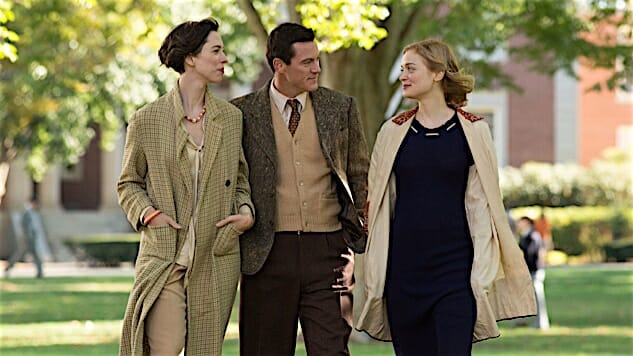Professor Marston and the Wonder Women

1. I love movies about smart people. Typically, when movies try to show someone is intelligent, they do it in a very dumb way. They’ll show a character rattling off a bunch of obscure factoids, or have them retreat to their Genius Lair and return with a deux ex machina solution to all the lingering plot holes. (Think Good Will Hunting, in which our titular hero is apparently smart because his brain is Wikipedia.) But a good movie, a movie that actually is smart, lets our characters shut up and think for a second. Professor Marston and the Wonder Women is about a lot of things—about “unconventional” relationships, about society’s rejection of what it finds scary and different, about feminism, about bondage, about following your heart’s individual truth—but what I think it is best at is being about smart people who aren’t any better at figuring out their lives than we are but are still gonna drive themselves nuts trying. I cared about everybody in this film and wanted them to be happy. But I delighted in watching them try to compute what exactly that happiness was.
2. Professor Marston and the Wonder Women tells the story of two married psychology professors at Radcliffe College, Bill Marston (Luke Evans) and Elizabeth Marston (Rebecca Hall), a couple who grew up together and are deeply in love but also restless and eager for discovery. While attempting to invent a lie detector test—they eventually create one but never patent it—they meet an eager, beautiful student named Olive (Bella Heathcote) who’s the daughter of a feminist icon and as desperate for knowledge and new experiences as they are. They eventually all fall in love and live together as a menage a trois before their university finds out, fires the couple and forces them to all go live together, now with their children, to find some sort of work. The work turns out, we learn in an unnecessary narrative flash-forward sequence, to serve as the basis of Bill’s increasing interest in comic books, creating a character, based on the two women in his life and based in his feminist ideals, who is strong, smart, truthful, heroic and, well, into bondage. The love story of this family turns out to be the origin story of Wonder Woman herself.
3. This is a fascinating story, particularly as we see little moments in the lives of the Marston clan reflected in the Wonder Woman mythos. (Olive wears metal wristbands all the time, the lasso is like the lie detectors Elizabeth and Bill invent, so on.) But writer-director Angela Robinson makes sure to keep it focused on the emotions involved, which is especially tricky considering all three characters are all so academically oriented—not to mention obsessed with deciphering the human mind and why we make the decisions we do—and are thus constantly questioning their own value systems. We really do believe that these three people love each other, and that they’re all better off together, but Robinson never tries to make this overly prudish and sanitized. The movie isn’t buttoned-up and restrained, but it isn’t brash and in your face either; it’s affably sexy, if such a thing is possible. And it never loses sight of its central premise of equality and acceptance, even if it gets a little too speechy and preachy about it. This movie’s heart is firmly in the right place.
-

-

-

-

-

-

-

-

-

-

-

-

-

-

-

-

-

-

-

-

-

-

-

-

-

-

-

-

-

-

-

-

-

-

-

-

-

-

-

-








































